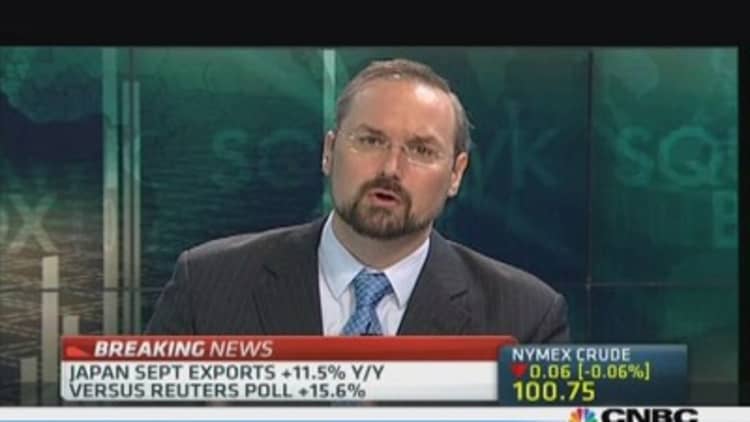Disappointing Japanese export numbers for September show that continued weakness in the yen is failing to give exporters the boost they need, say analysts.
Japan's exports rose a healthy 11.5 percent in September from a year earlier, but the figure was well below expectations for a 15.6 percent rise and slower than the 14.6 percent growth in August, data on Monday showed.
"There are some headwinds both on exports and imports... Exports aren't trading at the volumes that were expected, given where the yen is trading right now," Tony Nash, vice president at IHS told CNBC Asia's Squawk Box.
(Read more: Why Japan stocks may storm higher even if yen firms)

According to Ministry of Finance data, imports rose 16.5 percent in September, versus analysts' expectations in a Reuters poll for a 20 percent increase.
Japan posted its fifteenth straight trade deficit in the month at 932.1 billion yen (US$9.5 billion), roughly in line with expectations of a 933.9 billion yen deficit, as nuclear power plant closures continued to weigh on fuel import costs.
(Read More: What happened to a weak yen?)
Junko Nishioka, chief Japan economist at the Royal Bank of Scotland told CNBC that the ongoing weakness in the nation's domestic currency, which has declined nearly 13 percent this year, was not giving exporters as much of a boost as it has done in the past.
"When it comes to the impact to the export side... the positive impact [of a weaker yen] can be limited compared to historical patterns," said Nishioka.
Prime Minister Shinzo Abe first started talking up his ambitious plan to overhaul the nation's flagging economy late last year. It was hoped that the plan, which involves aggressive monetary easing late last year, fiscal stimulus and structural reform, would weaken the currency and stimulate Japan's export led economy. However, exports have failed to pick up as much as hoped.
(Read More: Abenomics speeds corporate investment, but not in Japan)

In early Asian trading on Monday, the yen was hovering just below 98 to the dollar. The yen has seen some strength in recent weeks as a partial U.S. government shutdown weighed on the U.S. dollar.
Nishioka said there were several other factors weighing on exports as well, including the fact ongoing nuclear power plant closures following the March 2011 tsunami and Fukushima power plant disaster, were still bumping up Japan's fuel import bill.
(Read more: Why Japan should fear US shutdown: IMF)
"In the beginning of this year, we had expected that some parts of the nuclear power plants would resume in a few months. But at the moment most of the nuclear power plants are now under inspection. It means that... the Japanese economy will have to pay further import costs to the energy consuming countries," she added.
However, IHS' Nash pointed out that one reason why exports had not picked up as much as hoped could be because many Japanese goods are increasingly being manufactured overseas in South East Asia.
"The Japanese are becoming increasingly confident with branded goods manufactured in other places, whereas previously they were only comfortable with branded goods if they were made in Japan," he said.
(Read more: Will Japan's elderly get burned by 'Abenomics'?)
"Although the money still comes to Japanese companies the volume of those exports is actually coming out of other countries out of the name of Japanese companies," he added.
—By CNBC's Katie Holliday: Follow her on Twitter @hollidaykatie


